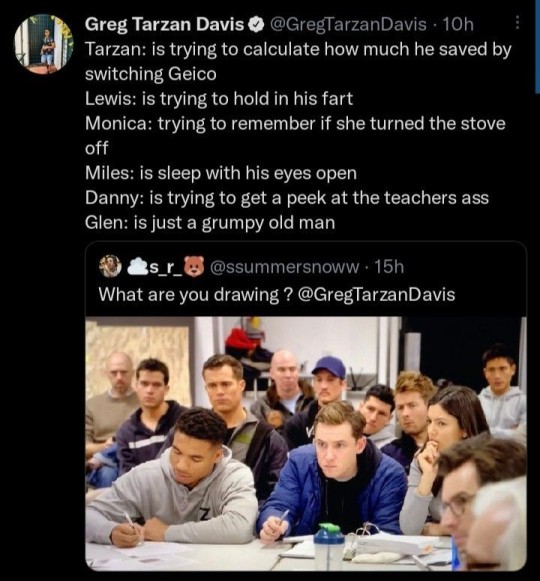#Lewis Powell
Explore tagged Tumblr posts
Text

rip jfk and abe but ur assassins are SERVING in every photo.
rest in peace tho sorry that happened
#abraham lincoln#john f kennedy#lee harvey oswald#lewis powell#john wilkes booth#confessions#anonymous confession
38 notes
·
View notes
Text
Robert Reich's Substack:
Friends, For years, conservatives have railed against what they call the “administrative state” and denounced regulations. But let’s be clear. When they speak of the “administrative state,” they’re talking about agencies tasked with protecting the public from corporations that seek profits at the expense of the health, safety, and pocketbooks of average Americans. Regulations are the means by which agencies translate broad legal mandates into practical guardrails. Substitute the word “protection” for “regulation” and you get a more accurate picture of who has benefited — consumers, workers, and average people needing clean air and clean water. Substitute “corporate legal movement” for the “conservative legal movement” and you see who’s really mobilizing, and for what purpose.
**
[...] Last week, the Supreme Court made it much harder for the FTC, the Labor Department, and dozens of other agencies — ranging from the Environmental Protection Agency to the Food and Drug Administration, Securities and Exchange Commission, Occupational Safety and Health Administration, Consumer Financial Protection Bureau, and National Highway and Safety Administration — to protect Americans from corporate misconduct.
On Thursday, the six Republican-appointed justices eliminated the ability of these agencies to enforce their rules through in-house tribunals, rather than go through the far more costly and laborious process of suing corporations in federal courts before juries. On Friday, the justices overturned a 40-year-old precedent requiring courts to defer to the expertise of these agencies in interpreting the law, thereby opening the agencies to countless corporate lawsuits alleging that Congress did not authorize the agencies to go after specific corporate wrongdoing. In recent years, the court’s majority has also made it easier for corporations to sue agencies and get public protections overturned. The so-called “major questions doctrine” holds that judges should nullify regulations that have a significant impact on corporate profits if Congress was not sufficiently clear in authorizing them.
[...] In 1971, the U.S. Chamber of Commerce, then a modest business group in Washington, D.C., asked Lewis Powell, then an attorney in Richmond, Virginia, to recommend actions corporations should take in response to the rising tide of public protections (that is, regulations). Powell’s memo — distributed widely to Chamber members — said corporations were “under broad attack” from consumer, labor, and environmental groups. In reality, these groups were doing nothing more than enforcing the implicit social contract that had emerged at the end of World War II, ensuring that corporations be responsive to all their stakeholders — not just shareholders but also their workers, consumers, and the environment.
[...] The so-called “conservative legal movement” of young lawyers who came of age working for Ronald Reagan — including Chief Justice John G. Roberts Jr. and Justices Clarence Thomas and Samuel A. Alito Jr. — were in reality part of this corporate legal movement. And they still are. Trump’s three appointments to the Supreme Court emerged from the same corporate legal movement. The next victory of the corporate legal movement will occur if and when the Supreme Court accepts a broad interpretation of the so-called “non-delegation doctrine.” Under this theory of the Constitution, the courts should not uphold any regulation in which Congress has delegated its lawmaking authority to agencies charged with protecting the public. If accepted by the court, this would mark the end of all regulations — that is, all public protections not expressly contained in statutes — and the final triumph of Lewis Powell’s vision.
Robert Reich wrote an interesting Substack piece on the history of the right-wing war on regulatory power that began with the infamous Powell Memo by Lewis Powell, and culminated with the recent Loper Bright Enterprises, Jarkesy, and Trump rulings.
#Robert Reich#SCOTUS#Courts#Leonard Leo#Lewis Powell#Judicial Activism#Major Questions Doctrine#Loper Bright Enterprises v. Raimondo#SEC v. Jarkesy#Powell Memo#Nondelegation Doctrine#John Roberts#Samuel Alito#Clarence Thomas#Regulatory Powers#Trump v. United States
68 notes
·
View notes
Text

Nurse he’s out again
#been doing activities and whatnot#also been getting back to watching the horror movies on my list#longlegs was.. it was a movie certainly#rays art#history#john wilkes booth#david herold#lewis powell#george atzerodt#samuel arnold#michael o’laughlen
18 notes
·
View notes
Note
The Seward attempt is wild because Powell tried to shoot (at point blank range) the first son that intercepted him but the gun jammed (at which point he bludgeoned the son with it and cracked his head open but he lived) and while he maimed Seward, the only reason he didn’t manage to kill him was because Seward rolled off the bed onto the floor and it was dark enough in the room that Powell couldn’t see very well. Seward’s bloodstained sheet is actually on display in the Seward House museum in Auburn NY in a room set up to look like Seward’s bedroom in his Washington house.
Seward had also been badly injured in a carriage accident a little over a week before the assassination attempt and was wearing a bandage or brace on his face to help heal a broken jaw.

The metal from the brace and the thick canvas of the bandages helped protect Seward when Powell started stabbing him. Seward was still nearly killed by Powell, but that probably kept the attack from being fatal. It's pretty remarkable that Seward not only survived, but eventually went back to work as Secretary of State and even bought Alaska!
#Lincoln Assassination#Assassination of Abraham Lincoln#Booth Conspiracy#Attempted Assassination of William H. Seward#William H. Seward#History#Lewis Powell#Civil War#Presidential Assassinations#Secretary Seward#Lincoln Administration#Seward's Folly#Alaska
16 notes
·
View notes
Text
everyone talks about iphone face for when actors look too modern. but i see the opposite in lewis powell because he died in the 1860s but i could 100% see him with an ipod touch

18 notes
·
View notes
Link
#supreme court#SCOTUS#Lewis Powell#us chamber of commerce#USA#politics#big business#corruption#corporate takeover#corporations
2 notes
·
View notes
Text
How It Happened
https://hartmannreport.com/p/the-billionaires-won-the-50-year-841?utm_source=post-email-title&publication_id=302288&post_id=151253908&utm_campaign=email-post-title&isFreemail=false&r=r3bio&triedRedirect=true&utm_medium=email The Hartmann Report The Billionaires Won: The 50-Year War on Democracy That Built Trump’s Oligarchy and Killed the American Dream Bought politicians, and a court on their…

View On WordPress
0 notes
Text




Top Gun Silliness
#top gun#top gun maverick#tom cruise#lewis pullman#val kilmer#glen powell#miles teller#pete mitchell#top gun iceman#hangster#icemav#tom kazansky#tom iceman kazansky#iceman kazansky#jake seresin#jake hangman seresin#hangman seresin#rooster bradshaw#bradley bradshaw#bradley rooster bradshaw#bob floyd#top gun silliness
3K notes
·
View notes
Text










Happy Thanksgiving, Fam!!! 💞💕
#happy thanksgiving#happy turkey day#found family#in the clerb we all fam#comfort cast#top gun men#top gun movie#top gun 1986#top gun#top gun maverick#top gun cast#miles teller#bradley bradshaw#rooster bradshaw#bradley rooster bradshaw#glen powell#jake seresin#jake hangman seresin#hangman seresin#hangman top gun#lewis pullman#robert bob floyd#bob floyd#top gun hangman#tom cruise#top gun maverick cast#pete maverick mitchell#top gun maverick hangman#maverick mitchell#mavdad
434 notes
·
View notes
Text
Masterlist!!!! 🤠
Making this because it's so hard for me to scroll through my stuff lol it'll be easier for you guys too! (And I'll pin it to my profile. 😏) GIFS bc I like the separation lol most of these are okay for 18 and under but just check the content warnings before reading 💗
Disclaimer: All the works are mine and written by me, please do not copy and paste. Reblogs are great! Thank you and enjoy!! 💗

1. Jake "Hangman" Seresin Masterlist
There were so many I had to condense the list lol

2. Tyler Owens Masterlist
Was also getting long so... :)

3. Bradley "Rooster" Bradshaw Masterlist
Not long enough ;) but willing to expand

4. Headcanons :)
This includes all of the men on this list btw

5. Robert “Bob” Floyd
“Yes, sir.”
“You’d like that, wouldn’t you?”

6. Glen Powell
It's a growing folder
#glen powell#fanfic#glen powell x reader#jake hangman fic#jake hangman seresin#hangman x reader#hangman x you#latina reader#miles teller#miles teller x reader#miles teller imagines#bob floyd#lewis pullman#top gun maverick#robert bob floyd#bob floyd x reader#hangman x rooster#bradley rooster bradshaw#rooster x reader#tyler owens#twisters#bradley bradshaw x reader#rooster x you#rooster imagine#bradley bradshaw#rooster fanfiction#rooster top gun#tyler owens twisters
427 notes
·
View notes
Text
I need friends like the TGM cast so badly I mean LOOK AT THEM




#top gun maverick#top gun#dagger squad#tgm cast#jake hangman seresin#bradley rooster bradshaw#natasha phoenix trace#robert bob floyd#mickey fanboy garcia#reuben payback fitch#javy coyote machado#glen powell#danny ramirez#miles teller#monica barbaro#jay ellis#greg tarzan davis#lewis pullman#i love them so much your honor
780 notes
·
View notes
Text


203 notes
·
View notes
Text
Dagger Christmas 🎄






















Happy Holidays guys! ILY 💚❤️🎁
@theharddeck @hangmanshoney @bradshawsbaby @bradshawass @callsign-phoenix @callsignuncle @bradleybeachbabe @sebsxphia @fanboygarcia @lewmagoo @bobfloydssunnies @top-hhun @iguana-braces @javihoney @justalonelyslytherin @rhettabbotts @caystar13star @daggerspare-standingby @birdy-bat-writes @mothdruid @dragon-kazansky @garnette-gal @topguncortez @robertcallsignbobfloyd @b-bradshaw @callsign-viper @bobfloydsbabe @hxad-ovxr-hxart @callsignstingray
#top gun maverick#bob floyd#hangman seresin#rooster bradshaw#fanboy garcia#coyote machado#phoenix trace#iceman kazansky#glen powell#lewis pullman#tom cruise#top gun meme
144 notes
·
View notes
Text



Back at it 💪
7 notes
·
View notes
Note
I adore Tobias Menzies and loved watching Manhunt. The last episode prompted a discussion between my coworker and I…
Was Johnson involved?
Andrew Johnson was a lot of terrible things and you won't find me defending him for pretty much any reason, but he wasn't involved in Lincoln's assassination. It was easy to raise questions about him because he was a Southerner and a slaveowner, but he was loyal to the Union throughout the Civil War -- the only Senator from a state that joined the Confederacy who remained loyal -- and one of the last things he would have done was join in a conspiracy with the Southern aristocracy that he hated with a passion during his entire political career. The fact that he had extremely adversarial relationships with Stanton and General Grant also didn't help his cause when some folks started pointing fingers at him after Lincoln's assassination.
But if John Wilkes Booth's conspiracy had been carried out as intended on the night of April 14, 1865, then-Vice President Johnson would have been assassinated the same night that Lincoln was killed and Secretary of State Seward very nearly was. Right around the time that Lincoln was shot by Booth and Seward was viciously attacked in his home by Lewis Powell, George Atzerodt was supposed to kill Johnson at the hotel where Johnson was living after his inauguration as Vice President a month earlier. Atzerodt, however, lost his nerve and ended up getting drunk instead -- but was still executed for his role in the conspiracy.
By the way, I also don't think Confederate President Jefferson Davis had any sort of role in planning or ordering Lincoln's assassination. Davis and the Confederate government had already abandoned Richmond when Lincoln was killed, and it was clear that the war was basically over. Davis -- who also hated (and was hated by) Andrew Johnson -- recognized that President Lincoln was going to be the South's best bet for a Reconstruction that would help rebuild the former Confederacy without extreme punitive measures. There were definitely Confederate sympathizers and Confederate secret service operatives who were in contact with Booth over the years, and many of them were Northern business leaders with longstanding connections in the Southern states or who were angry over the abolition of slavery and its economic impact. But killing Lincoln -- especially at that point -- was far worse for the South because it led to Andrew Johnson as President, and Johnson really was probably the last person in America who Jefferson Davis would have wanted to be President of the United States. Operationally, it would not have made sense for Davis to order Lincoln's assassination, particularly at that time.
In his post-war book, The Rise and Fall of the Confederate Government (BOOK | KINDLE), published in 1881, Davis wrote about learning of Lincoln's assassination and realizing what Andrew Johnson's succession meant:
"For an enemy so relentless in the war for our subjugation, we could not be expected to mourn [Lincoln's death]; yet, in view of its political consequences, it could not be regarded otherwise than as a great misfortune to the South. [Lincoln] had power over the Northern people, and was without personal malignity toward the people of the South; his successor [Andrew Johnson] was without power in the North, and the embodiment of malignity toward the Southern people, perhaps the more so because he had betrayed and deserted them in the hour of their need... Lincoln had been assassinated, and a vindictive policy had been substituted for his, which avowedly was to procure a speedy surrender of the army upon any terms. His [Lincoln's] evident wish was to stop the further shedding of blood; that of his successors [Andrew Johnson]...was to extract all which it was possible to obtain...it is clearly to be inferred that, but for the untimely death of Lincoln, the...wounds inflicted on civil liberty by the 'reconstruction' measures might not have left their shameful scar on the United States."
#History#Assassination of Abraham Lincoln#Lincoln Assassination#Presidents#Abraham Lincoln#President Lincoln#Booth Conspiracy#Andrew Johnson#President Johnson#Presidential Assassinations#Conspiracies#John Wilkes Booth#George Atzerodt#Lewis Powell#Jefferson Davis#President Davis#Confederate States of America#Confederacy#Confederate History#Civil War#Civil War History#End of the Civil War#Politics#Political Conspiracies#Edwin Stanton#Manhunt#Apple TV
16 notes
·
View notes
Text
can’t convince me this isn’t exactly how drunk jake seresin acts
#glen powell#jake seresin#top gun maverick#lewis pullman#monica barbaro#jay ellis#lewis pullmans laugh though#i want to marry them all
3K notes
·
View notes